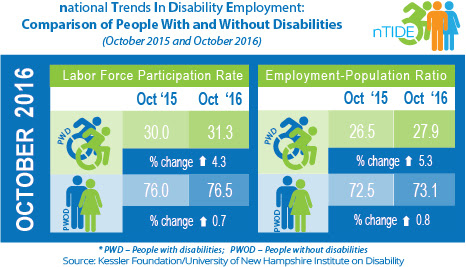URHAM, NH – Trend continues for Americans with disabilities as economic indicators improve for seventh consecutive month, according to today's National Trends in Disability Employment – Monthly Update (nTIDE), issued by Kessler Foundation and University of New Hampshire’s Institute on Disability (UNH-IOD). During the month of November, our attention turns to efforts to return veterans to the workforce. The employment programs resulting in job gains for veterans with disabilities may serve as models for the broader population of jobseekers with disabilities.
In the Bureau of Labor Statistics Jobs Report released Friday, November 4, the employment-to-population ratio for working-age people with disabilities increased from 26.5 percent in October 2015 to 27.9 percent in October 2016 (up 5.3 percent; 1.4 percentage points). For working-age people without disabilities, the employment-to-population ratio also increased from 72.5 percent in October 2015 to 73.1 percent in October 2016 (up 0.8 percent; 0.6 percentage points). The employment-to-population ratio, a key indicator, reflects the percentage of people who are working relative to the total population (the number of people working divided by the number of people in the total population multiplied by 100).
“2016 is shaping up to be better employment-wise for people with disabilities, compared to 2015,” noted John O’Neill, Ph.D., director of employment and disability research at Kessler Foundation. “It’s noteworthy that the gains for people with disabilities continue to outpace those of people without disabilities.” The labor force participation rate for working-age people with disabilities increased from 30.0 percent in October 2015 to 31.3 percent in October 2016 (up 4.3 percent; 1.3 percentage points). For working-age people without disabilities, the labor force participation rate also increased from 76.0 percent in October 2015 to 76.5 percent in October 2016 (up 0.7 percent; 0.5 percentage points). The labor force participation rate is the percentage of the population that is working or actively looking for work.
Kessler Foundation & University of New Hampshire release nTIDE Report for October – Monthly UpdatenTIDE Full October 2016 Report >Read more > |
|
Trends in Disability Employment - National Update is funded, in part, by a grant from the National Institute on Disability, Independent Living, and Rehabilitation Research (NIDILRR) under grant number 90RT5022-02-01,and Kessler Foundation.

No comments:
Post a Comment